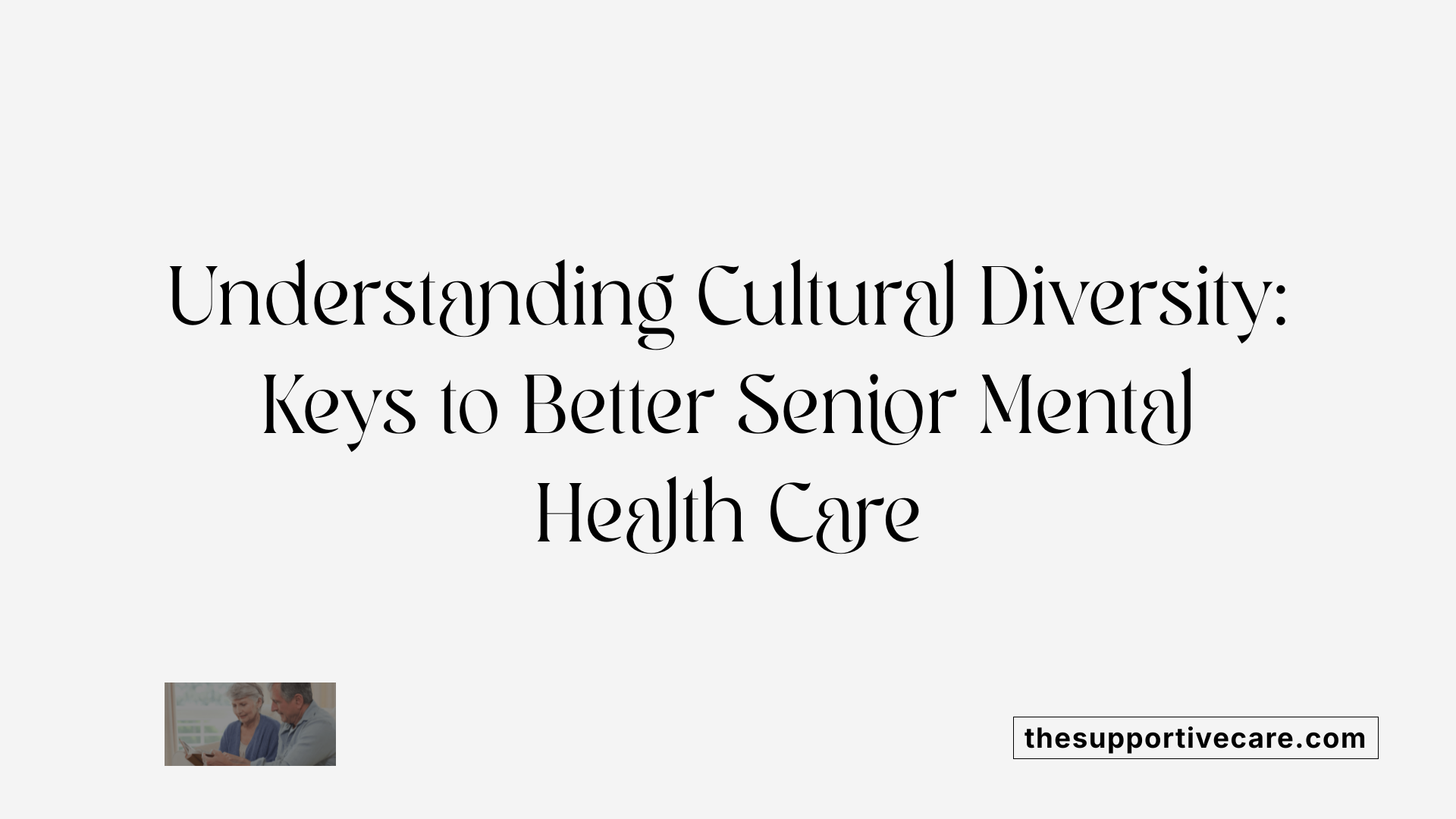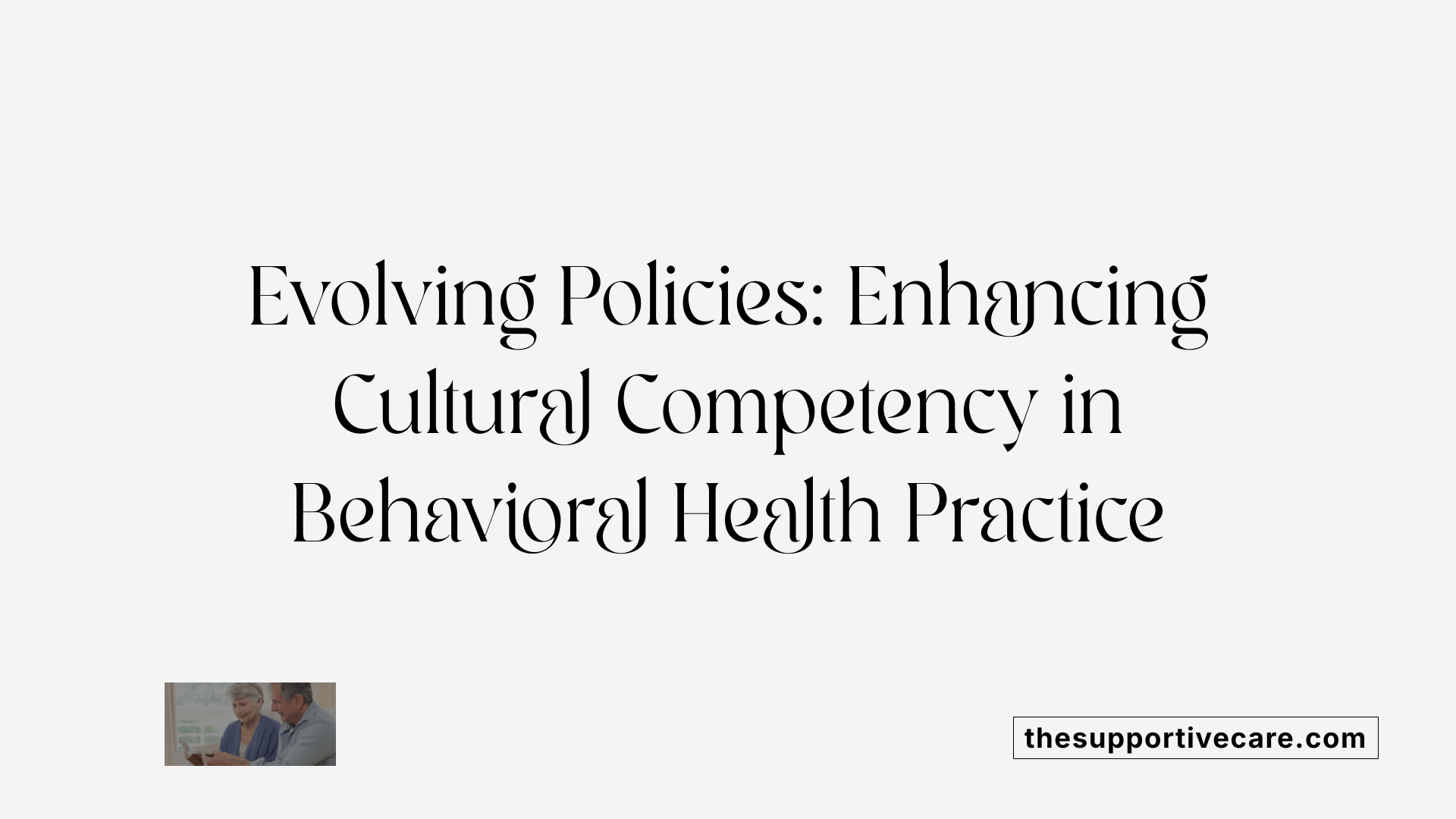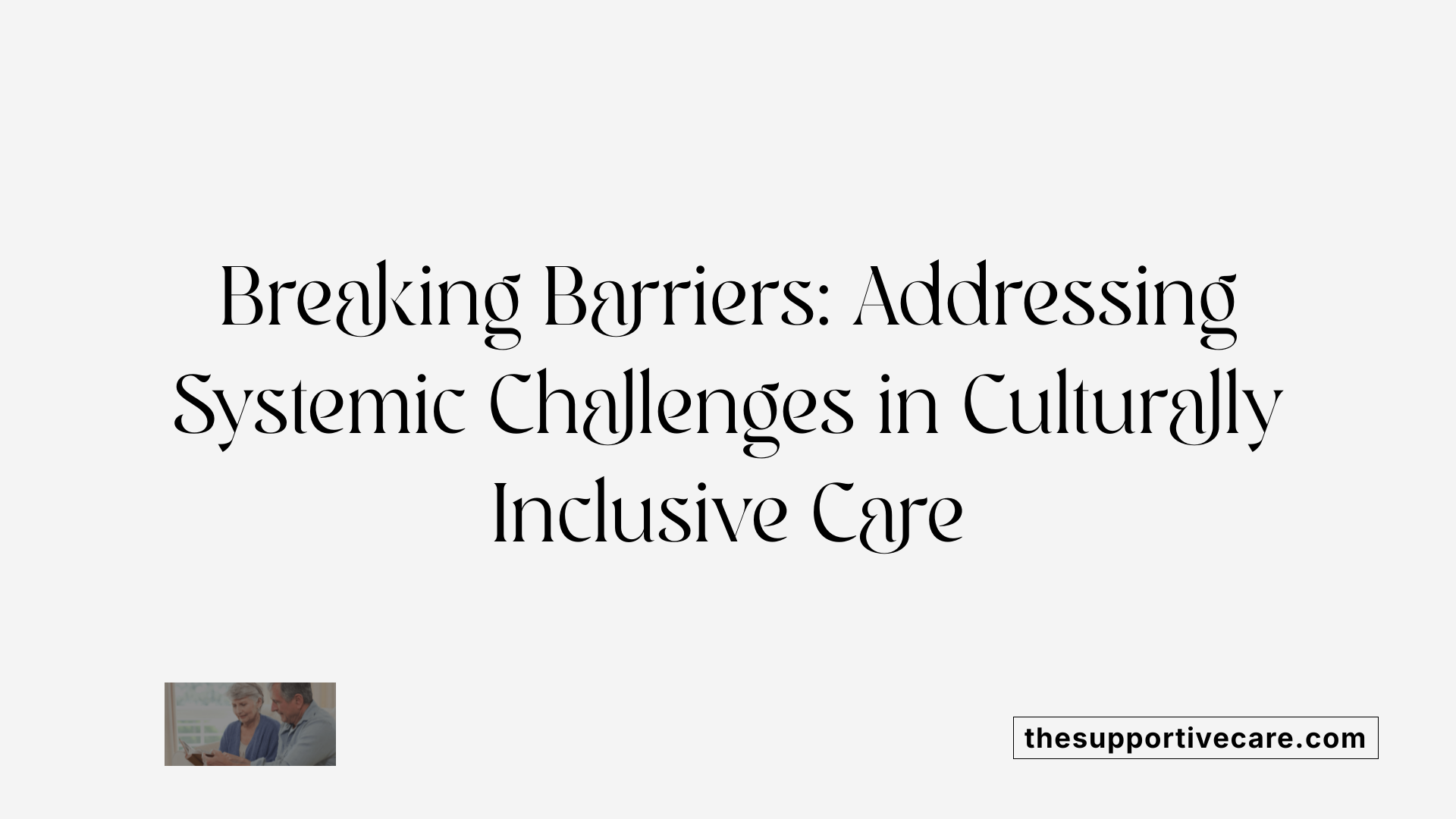Understanding the Crucial Role of Multicultural Competence
As the aging population in the United States becomes increasingly diverse, the importance of integrating multicultural considerations into senior behavioral health services cannot be overstated. Recognizing differences in cultural beliefs, preferences, and systemic barriers is essential to delivering respectful, effective, and equitable mental health care for older adults from all backgrounds.
The Impact of Cultural Diversity on Senior Mental Health

How do perceptions of health and illness influence elderly mental health?
Cultural backgrounds significantly shape how older adults understand and experience health and illness. In many cultures, mental health issues are viewed through spiritual or traditional lenses, such as spirits or karma, which directly influence how symptoms are recognized and addressed. For example, some communities may interpret mental health symptoms as spiritual disturbances or moral failings rather than medical conditions, affecting their willingness to seek professional help. Traditional health systems like Ayurveda and Traditional Chinese Medicine see mental health as integrated with overall well-being, contrasting with Western medical models that often separate mental and physical health. This holistic view can guide treatment preferences and acceptance of interventions.
Cultural beliefs about health strongly impact how symptoms are expressed and understood, leading to variability in diagnosis and treatment approaches across different groups. Recognizing these perceptions is critical for delivering effective, culturally sensitive care that respects patients' worldview and encourages engagement.
What help-seeking behaviors and treatment preferences differ across cultures?
Help-seeking behaviors among older adults are deeply rooted in cultural norms and societal expectations. In many communities, seeking help from mental health professionals may be stigmatized, associated with shame, or viewed as a sign of weakness. As a result, elders might prefer consulting family members, religious leaders, or traditional healers rather than formal health providers.
These preferences can delay intervention, worsen outcomes, and create barriers to care. For instance, in some cultures, discussing mental distress openly is taboo, leading individuals to somatize—express emotional issues through physical symptoms—which often results in visits to primary care rather than mental health specialists.
Treatment choices are also influenced by cultural congruence. Elders may favor traditional remedies or community-based interventions over pharmacological or psychotherapy options. Understanding these preferences allows providers to develop more acceptable, effective, and culturally aligned treatment plans.
How do traditional health systems and holistic approaches influence mental health care?
Traditional and holistic health systems emphasize interconnectedness between mind, body, and environment, offering an alternative framework to Western reductionist approaches. Systems like Ayurveda and Traditional Chinese Medicine incorporate mind-body practices, herbal remedies, acupuncture, and spiritual rituals that resonate with many cultural groups.
This integrative perspective can support mental health treatment by addressing underlying cultural beliefs and providing culturally familiar practices, increasing acceptance and adherence. In some communities, these traditional modalities serve as primary or adjunct therapies, fostering trust and bridging gaps in Western mental health services.
Incorporating traditional health approaches into mental health care often involves respecting cultural practices, involving community healers, and tailoring interventions to match cultural values. This culturally respectful integration results in more comprehensive, person-centered care, which aligns with the holistic view of health prevalent in many cultures.
What are the common barriers to accessing mental health services in diverse populations?
Barriers often include stigma and shame associated with mental illness, which discourage help-seeking behaviors. These social stigmas can be compounded by concerns over discrimination, language differences, and unfamiliarity with Western healthcare models.
Language barriers hinder effective communication and accurate assessment, leading to misunderstandings or misdiagnoses. Limited culturally appropriate resources and lack of diversity among healthcare providers can also reduce trust and accessibility. Older adults from marginalized groups frequently face systemic obstacles such as transportation issues, financial constraints, and unfamiliarity with available services.
Historical traumas, discrimination, and systemic inequities further exacerbate these challenges, making it less likely for minority elders to seek or receive adequate mental health care. Addressing these barriers requires developing culturally competent, accessible, and community-engaged services.
How can community-based resources and traditional practices improve behavioral health care?
Community resources and traditional healing practices are invaluable assets in delivering culturally competent mental health care. Community organizations, religious groups, and traditional healers often serve as trusted entities that can facilitate access, reduce stigma, and promote engagement.
Tailoring interventions to include language-specific services, cultural rituals, and family involvement enhances relevance and acceptance. Community-based programs can also provide social support, educational outreach, and prevention strategies rooted in cultural norms.
For example, culturally adapted peer support groups or faith-based intervention programs significantly improve participation rates among minority elders. Incorporating traditional healing methods alongside Western treatments can also respect cultural identities and foster holistic well-being.
How can moving towards equitable partnerships with communities shape mental health services?
Evolving from traditional notions of cultural competence to fostering equitable community partnerships leads to more responsive and effective mental health services. Such partnerships involve community members in planning, implementing, and evaluating programs, ensuring interventions align with local values and needs.
This collaborative approach enhances trust, promotes shared ownership, and reduces power imbalances between providers and communities. It encourages culturally relevant advocacy, policy change, and resource allocation, making services more accessible and sustainable.
Implementing these partnerships involves ongoing dialogue, community training, and empowerment initiatives that recognize the assets within diverse cultural groups. Ultimately, this shift ensures health services are not only culturally sensitive but also just and equitable.
How does Colorado's Office of Behavioral Health address cultural diversity?
The Colorado Office of Behavioral Health (OBH) recognizes the state's diverse population and is committed to enhancing culturally competent mental health services. Since 2004, OBH has pursued a strategic plan aimed at organizational cultural competency, including the development of the 'Colorado Mental Health Services Cultural Competency Policy Plan.'
OBH established the Cultural Competency Advisory Council (CCAC), which consists of experts supporting policy development, training, and workforce diversity efforts. The agency also advocates for compliance with the National Standards for Culturally and Linguistically Appropriate Services (CLAS) and integrates models from national entities like the U.S. Department of Health and Human Services.
Assessment tools such as the Cultural and Linguistic Competence Family Organization Assessment (CLCFOA) and the Cultural and Linguistic Competence Policy Assessment (CLCPA) are utilized to gauge organizational readiness. In addition, OBH offers specialized training programs, including culturally informed treatment curricula and courses on working with diverse cultural groups.
Through these initiatives, OBH strives to reduce disparities, improve engagement, and promote culturally responsive practices across Colorado's behavioral health system.
What initiatives support culturally competent care in Colorado?
Colorado's OBH supports various initiatives, including specialized training for providers to increase cultural awareness, understanding client backgrounds, and integrating culturally specific interventions. The agency's programs emphasize principles like cultural humility, ongoing education, and systemic advocacy.
The 'Culturally Informed Treatment' curriculum, updated in 2013, equips providers with skills to address cultural influences on mental health. Training topics include working with offender and military populations, addressing stigma, and understanding cultural norms.
Moreover, OBH encourages health organizations to implement assessments such as the CLCFOA and CLCPA, which help evaluate and improve cultural competence.
Adopting these practices ensures that services are respectful of diverse cultural values, language preferences, and traditional practices. Such investments contribute to closing disparities and improving health outcomes in Colorado.
How will cultural competence shape future geriatric mental health services?
As the U.S. population ages and becomes more racially and ethnically diverse, integrating cultural competence into geriatric mental health services is vital. The rapid growth of minority older adults means that mental health care must be tailored to meet unique cultural needs.
Leading organizations like the APA emphasize that acknowledging and addressing cultural, linguistic, and social differences can improve diagnosis accuracy, treatment engagement, and outcomes. Training mental health professionals in multicultural competencies, including age-specific considerations, helps combat ageism and systemic biases.
Research indicates that culturally adaptable mental health interventions can reduce disparities and enhance resilience among diverse elders. Future services will increasingly incorporate community engagement, culturally tailored therapies, and systemic efforts to eliminate barriers.
The ongoing focus on cultural humility, ongoing education, and community partnerships will be essential to ensure that mental health services are equitable, effective, and respectful of older adults' diverse identities.
How do data and research inform culturally responsive mental health policies?
Comprehensive data and research are fundamental in shaping evidence-based policies that address disparities and promote equity. Studies on racial and ethnic differences in the prevalence of conditions like Alzheimer's, depression, and anxiety inform targeted interventions.
Research findings support the design of culturally adapted assessment tools, treatment methods, and outreach strategies. For instance, validated translated screening instruments improve diagnostic accuracy among non-English-speaking elders.
Policy frameworks, like the APA's initiatives and SAMHSA's TIP 59 guidelines, emphasize cultural humility, workforce diversity, and organizational competence. Data demonstrates that addressing systemic barriers—such as discrimination, stigma, and resource gaps—can substantially reduce disparities.
Ongoing research helps monitor progress, identify emerging needs, and refine approaches, ensuring that mental health policies remain responsive to evolving demographic landscapes.
How can healthcare providers address systemic barriers faced by minority seniors?
Providers play a critical role in overcoming systemic obstacles like racism, economic disparity, and language barriers. Strategies include offering multilingual services, employing culturally diverse staff, and providing interpreter services to ensure effective communication.
Training in cultural humility and awareness enables providers to recognize and challenge their own biases, creating more inclusive care environments. Establishing partnerships with community organizations enhances outreach and trust.
Addressing social determinants of health—such as housing, transportation, and income support—is essential to remove access barriers. Implementing integrated care models that combine physical and mental health assessments also improves outcomes.
Finally, advocating for policy changes that promote health equity and allocate resources to underserved communities ensures that systemic barriers are addressed at a structural level.
Overview of strategic approaches to improve multicultural mental health service delivery
Efforts to improve services include workforce diversification, cultural competence training, community engagement, and policy reforms. Recruiting providers from diverse backgrounds enhances cultural understanding and trust.
Education initiatives, such as the OBH's training programs, focus on increasing awareness of cultural influences, reducing biases, and teaching culturally adapted interventions.
Community outreach efforts involve collaborating with local organizations, religious institutions, and traditional healers to raise awareness and facilitate access.
Policy reforms aim to institutionalize cultural competence through standards, funding priorities, and organizational assessments. Tools like the Cultural and Linguistic Competence assessments support ongoing quality improvement.
By integrating these strategies, healthcare systems can create more inclusive, effective, and equitable mental health services for diverse older populations.
The Evolution of Cultural Competency Policies and Training in Behavioral Health

Why is it important to consider cultural and personal preferences when caring for geriatric patients?
Considering cultural and personal preferences in geriatric care is vital for delivering respectful, personalized treatment that recognizes each individual's background and experiences. Such sensitivity fosters trust between caregivers and older adults, which enhances communication and cooperation. Research initiatives, such as those from SIUE, underscore that cultural competence improves seniors' quality of life and health outcomes, including better adherence to treatment and reduced hospital readmissions. Incorporating cultural values supports emotional well-being and preserves identity, aligning with best geriatric care practices. This patient-centered approach not only respects dignity but also contributes to more effective, holistic healthcare outcomes.
Systemic Challenges and Structural Barriers to Culturally Inclusive Care

What are the cultural barriers to accessing mental health services?
Cultural barriers to accessing mental health services are significant obstacles for many minority elders. Stigma associated with mental illness often deters individuals from seeking help, as they fear judgment, discrimination, or social shame within their communities. Additionally, ethnic minorities, including refugees and immigrants, encounter language barriers that impede effective communication with healthcare providers. Cultural misunderstandings about mental health can lead to misinterpretation of symptoms and reluctance to engage with traditional mental health systems. Lack of culturally sensitive treatment options and awareness about available resources further increases the gap in service utilization. These barriers are compounded by trauma, separation from loved ones, and experiences of discrimination that heighten mental health needs but simultaneously discourage seeking care. To bridge these gaps, it is crucial to provide culturally appropriate support and education. Increasing mental health awareness, reducing stigma within communities, and ensuring access to linguistically and culturally tailored services are vital steps toward improving engagement and treatment outcomes for diverse populations.
How does systemic racism influence disparities in elder mental health care?
Systemic racism plays a fundamental role in perpetuating disparities in mental health care among older racial and ethnic minorities. Historical discrimination in housing, employment, and healthcare has created socioeconomic disadvantages that adversely affect mental health. Many minority elders face chronic stress, social marginalization, and limited resources, which increase their risk for mental health issues. Healthcare institutions often harbor implicit biases that affect diagnosis and treatment. Minorities are frequently underdiagnosed or misdiagnosed due to cultural misunderstandings or stereotypes held by providers. Language barriers, fewer culturally relevant services, and a lack of trust in healthcare systems further reduce engagement with mental health care among minority elders. Addressing these disparities requires systemic reforms: dismantling racist policies, promoting diversity within the healthcare workforce, and embedding culturally responsive practices into health systems. Only through comprehensive structural change can equitable mental health care for all elders be effectively realized.
What are the challenges related to language and assessment in minority elder populations?
Language barriers are a prominent challenge in assessing and diagnosing mental health disorders among minority older adults. Many have limited proficiency in English, which affects their ability to communicate symptoms accurately, understand diagnoses, and follow treatment plans. Standard assessment tools developed in English may not translate well culturally or linguistically, leading to inaccurate diagnoses—particularly for depression, anxiety, and cognitive impairments. The absence of validated translated instruments or culturally adapted assessments further complicates detection. Involving qualified interpreters and cultural consultants can improve communication and diagnostic accuracy. Culturally sensitive evaluation methods, including translated tools like the Geriatric Depression Scale and culturally appropriate interview techniques, help providers better understand the patient's experience. Enhancing the capacity of healthcare settings with bilingual staff and interpreter services is essential to overcoming these barriers. By doing so, providers can deliver more accurate, respectful, and effective mental health care tailored to the cultural context of minority elders.
What systemic issues contribute to healthcare disparities for minority elderly populations?
Several systemic issues underpin healthcare disparities affecting minority elders. Rooted in historical racism, these issues include policy neglect, socioeconomic inequities, and institutional biases that restrict access and quality of care. Limited availability of culturally and linguistically appropriate services in many healthcare settings hinders effective engagement. The shortage of healthcare providers from minority backgrounds reduces culturally relevant care. Discriminatory practices, including underfunding community health programs and lack of interpreter services, exacerbate these inequities. These systemic barriers often lead to delays in seeking care, underdiagnosis of mental health conditions, poor management of chronic illnesses, and higher reliance on emergency services. Minority elders may also experience decreased trust in healthcare providers due to past negative experiences or perceived discrimination. Addressing these systemic issues requires broad policy reforms aimed at resource allocation, workforce diversification, and the adoption of culturally responsive standards. Enhancing community-based services and ensuring equitable funding are essential steps toward reducing disparities and promoting health equity for minority elder populations.
Building an Inclusive Future for Elder Mental Health Care
As the demographic landscape continues to shift toward a more diverse aging population, it is imperative that behavioral health services evolve to meet these multicultural needs. Embracing cultural competence, addressing systemic barriers, and fostering ongoing education and community partnerships are essential steps toward equitable, respectful, and effective mental health care for seniors from all backgrounds. Through concerted effort and collaboration, providers and policymakers can create a healthcare environment that truly values diversity and promotes mental well-being for every older adult.
References
- Cultural Diversity and Mental Health: Considerations for Policy and ...
- Culturally Informed and Inclusive Behavioral Health Program Services
- Multicultural aging resource guide
- Providing Care to a Diverse Older Adult Population
- Centering Culture in Mental Health: Differences in Diagnosis ...
- Navigating Cultural Diversity in Older Adults' Mental Health
- Behavioral Health - Think Cultural Health - HHS.gov
- From Competence to Humility: Advancing Culturally Responsive ...


































































































